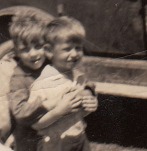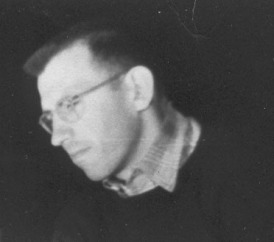![p956070856-5[1]](https://clcurriedotcom.files.wordpress.com/2014/06/p956070856-51.jpg?w=199&h=159) There is something distance in the singular cry of the blue jay that pulls me home to places along my trodden path.
There is something distance in the singular cry of the blue jay that pulls me home to places along my trodden path.
Perhaps its sharpness awakens memories seemingly dormant that beg to be noticed just about the time one thinks they are forgetting. Whether in mid-conversation, quietly reading a book, or my hands plunged in hot soapy water washing the last of the dishes with my mind lost in thoughts of weekend plans or nothingness, that cry…brings me to a halt. I am transported, ever so briefly, but enough to recall steps, paths, and moments of wonderment along the way.
My youthful summers were often spent along the winding trails of the birch and pine woods around our summer cabin. A rough place, by most standards, made of log and mortar with a cinder block foundation; it was often cold with the wind whistling through the walls. My dad needed to build a fire in the wood stove on those Michigan mornings to get the summer day started, especially when we needed to be brave enough to visit the outhouse and wash up in the icy cold water pumped out of the earth from the well. Built by the Civilian Conservation Corp (CCC) near Gladwin, Michigan, my grandfather owned the place affectionately referred to as the Ca-Ha-Bo club, which he frequented with his buddies back in the 1930s. My dad and his brother went along as early as 1936, fished, climbed, and played along the moist treacherous ravines and sunny sand mound roads. My father made it his own in the late 1940s when he and his high school friends all decided to get out of the city and into the woods. In his dad’s old 1931 Essex with a rumble seat, they made a book of memories just being boys. Until the boys turned to men and began bringing their young families to the shabby old cabin along the Tittabawassee River which snakes through mid-Michigan, and then it was our rustic get-away until 1975, when no one was left to visit and it was sold.
We did a lot of nothing there, and the nothingness was lovely.
We colored and played cards for hours on the screened-in porch that look out over the river, fished off the dock and occasionally rowed out to the middle of the river with my dad, our bobbers dancing on the waves in waiting like our dreams of ‘someday,’ and returned with our strings full of perch and sunfish for dinner. In the sleepy mornings, the air rich with aromatic cedar and pines, we would take our bowls out to the sand roads and gather wild raspberries and blackberries until our bowls and bellies were full and our mother of pearl finger nails stained red. These were the sweetest of times, no rush, few demands; childhood in its simplest form.
But it was our walks in the woods, passed spindly groves of birch and aspen, and then deep into the thicket that scratched our youthful legs, that was most daring and adventurous for me. Always with other siblings, there were moments when I wished I was alone. The sun light shone bright up above the canopy of leaves against that bright blue sky, as the ‘old Indian trails’ grew narrower and more difficult to navigate. Though we hoped to see a some deer or maybe a bear, with a brood of kids, some loudly thinking there were chieftains, we didn’t see much, except chipmunks and raccoons, and the ever present birds.
These days, when I hear the aggressive blue jay cry outside my grown-up home so far from those northern woodlands, and see all the sparrows and dove scatter in its presence, it is there that I am transported….to the sun dabbled path, the sisters out ahead, and in those moments when the call of the jay would echo through the forest walls making me shiver with aliveness and possibilities. What will I be when I grow up? Where will I live? When will I fall in love and who will he be? Until someone’s voice as shill as the jay would bark at me to not fall behind, I was happily getting lost in my own world.
There in the forest, where later in my teens, older sisters off with their important lives, the younger kids napping in the cabin, I would take my flute and walk to a clearing, where I would sit on a rock and listen to the deep tones of my instrument mingling with the fluttering leaves along the edges. I would sing, without holding back, and dream of stages and audiences, of flowing dresses and gentlemen extending their hand to dance with me…and of kisses…my rosy lips perched in a bow, eyes closed feeling the hand of the wind caress my face and comb its fingers through my hair. There on that rock in the clearing, I could create my own world. The blue jay, plentiful in those mid-Michigan woods full of oak trees, would call to me when the sun was high, or when it was getting late, wake me from my dreaminess, and remind me that I wasn’t alone in my aloneness.
I remember once, over twenty years ago, walking along a path in northern Wisconsin near the border of Minnesota in the woods at Amnicon Falls, when the blue jay made itself known. It was a troubling but exciting time for me, full of complications and cold hard facts. At one point, I was walking along a wooded trail just ready to enter a deeper, darker part of the forest, and the blue jay called its singular cry….echoing, echoing, echoing through the forest as I looked up into the blinding sun for that blue-winged alarmist. I couldn’t see him. I couldn’t see much at that time in my life, but could hear the rustling of the trees in the summer breeze inviting me to move along. I could feel my footing…cautious but bold …and continued to follow my hearts desire…the bird and its call weaving through the trees, flirting with my senses, daring me to listen.
Many of us are highly sensitive to sounds and smells, which is sometimes a blessing and at other times a curse, for they can easily distract us when we should remain present and focused. I see this all the time in the classroom and gently bring a child back into reality, after allowing the student to quickly jot down whatever he or she was remembering for later use in their writing, something that was lost on me in the 1960s, when I was aptly labeled “a day-dreamer.”
The tinkling of glass wind-chiming can take me back to that screened-in porch, someone snapping their chewing gum to my mom happily ironing, the chattering chickadees in spring to a morning in Wisconsin when, through a tent window, I watched a flock of those black-capped wonders of endurance wake up the day all chipper with excitement. The sound of the furnace turning on in winter, its comforting hummm, sends warm goose bumps along my skin, as it did when I was a child, and cold, and would crawl under the bed to lie up against the heating vent. The sound of clinking dishes and people talking at the same time with the lifts of laughter, a couple bars of a song sung, and the bending sighs… can take me back to the kitchens of my youth, aproned women all busy gossiping and working at the same time; people now gone.
The sound of a train whistle in the distance, like the sound of the fog horns from passing ships off the coast of the great lakes; seagulls in the morning, geese in formation honking their goodbyes as they left the brilliant colored autumn behind, and the sound of hushed stillness … the woods covered in fresh snow…can transport me without warning. New sounds like the cicadas buzzing the trees at the height of a blazing hot afternoon in south Texas and fire truck sirens make me think of my boy playing in the yard with his trucks, now off on one of those big engine racing through traffic, and the southern sweetness of the solitary song of the mockingbird in the empty street of a late night…sharing multiple melodies it has learned along the way, to no one except itself, all so clear and distractive, yet surely meant for some purpose in this maddening world. Why else would the mockingbird sing, if not for us to stop and listen?
But, the singular call of the blue jay echoes through my ears into the years, and in its hard call seems to remind me, like it did then, that I am falling behind the others, that it’s getting late, that all around me are dark forests with unknown adventures waiting for me to boldly enter. Even here in my suburban kitchen, cup of coffee, dogs at my feet, and the constant rhythmic tick of the clock, that bully blue jay makes me stop and think and remember…I’m not alone in my aloneness, and it’s time to gain my footing for the path that leads forward.







